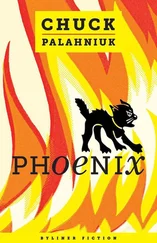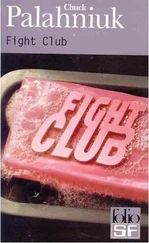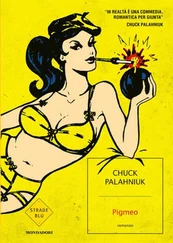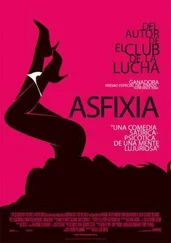Right now, I'm not even sure I can read the present.
Helen holds up the paper and reads. In the dull, counting voice she used for the flying spell, she reads a few quick lines. She lowers the paper and says, «Mirror, mirror, tell us what our future will be if we love each other and use our new power.»
Her new power.
«I made up the “mirror, mirror” part,» Helen says. She slips her hand around mine and squeezes, but I don't squeeze back. She says, «I tried this at the office with the mirror in my compact, and it was like watching television through a microscope.»
In the mirror, our reflections blur, the shapes swim together, the reflection mixes into an even gray.
«Tell us,» Helen says, «show us our future together.»
And shapes appear in the gray. Light and shadows swim together.
«See,» she says. «There we are. We're young again. I can do that. You look like you did in the newspaper. The wedding photo.»
Everything's so unfocused. I don't know what I see.
«And look,» Helen says. She tosses her chin toward the mirror. «We're ruling the world. We're founding a dynasty.»
But what's enough? I can hear Oyster say, him and his overpopulation talk.
Power, money, food, sex, love. Can we ever get enough, or will getting some make us crave even more?
Inside the shifting mess of the future, I can't recognize anything. I can't see anything except just more of the past. More problems, more people. Less biodiversity. More suffering.
«I see us together forever,» she says.
I say, if that's what she wants.
And Helen says, «What's that supposed to mean?»
Just whatever she wants it to mean, I say. She's the one pulling the strings here. She's the one planting her little seeds. Colonizing me. Occupying me. The mass media, the culture, everything laying its eggs under my skin. Big Brother filling me with need.
Do I really want a big house, a fast car, a thousand beautiful sex partners? Do I really want these things? Or am I trained to want them?
Are these things really better than the things I already have? Or am I just trained to be dissatisfied with what I have now? Am I just under a spell that says nothing is ever good enough?
The gray in the mirror is mixing, swirling, it could be anything. No matter what the future holds, ultimately it will be a disappointment.
And Helen takes my other hand. Holding both my hands in hers, she pulls me around, saying, «Look at me.» She says, «Did Mona say something to you?»
I say, you love you. I just don't want to be used anymore.
Above us are the chandeliers, glowing silver in the moonlight.
«What did Mona say?» Helen says.
And I'm counting 1, counting 2, counting 3 …
«Don't do this,» Helen says. «I love you.» Squeezing my hands, she says, «Do not shut me out.»
I'm counting 4, counting 5, counting 6 …
«You're being just like my husband,» she says. «I just want you to be happy.»
That's easy, I say, just put a «happy» spell on me.
And Helen says, «There's no such spell.» She says, «They have drugs for that.»
I don't want to keep making the world worse. I want to try and clean up this mess we've made. The population. The environment. The culling spell. The same magic that ruins my life is supposed to fix it.
«But we can do that,» Helen says. «With more spells.»
Spells to fix spells to fix spells to fix spells, and life just gets more miserable in ways we never imagined. That's the future I see in the mirror.
Mr. Eugene Schieffelin and his starlings, Spencer Baird and his carp, history is filled with brilliant people who wanted to fix things and just made them worse.
I want to burn the grimoire.
I tell her about what Mona told me. About how she's put a spell on me to make me her immortal love slave for all of eternity.
«Mona's lying,» Helen says.
But how do I know that? Whom do I believe?
The gray in the mirror, the future, maybe it's not clear to me because now nothing's clear to me.
And Helen drops my hands. She waves her hands at the Regency armoires, the Federalist desks and Italian Renaissance coat racks, and says, «So if reality is all a spell, and you don't really want what you think you want …» She pushes her face in my face and says, «If you have no free will. You don't really know what youknow. You don't reallylove who youonly think you love. What do you have left to live for?»
Nothing.
This is just us standing here with all the furniture watching.
Think of deep outer space, the incredible cold and quiet where your wife and kid wait.
And I say, please. I tell her to give me her cell phone.
The gray still shifting and liquid in the mirror, Helen snaps open her purse and hands me the phone.
I flip it open and dial 911.
And a woman's voice says, «Police, fire, or medical?»
And I say, medical.
«Your location?» the voice says.
And I tell her the address of the bar on Third where Nash and I meet, the bar near the hospital.
«And the nature of your medical emergency?»
Forty professional cheerleaders overcome with heat exhaustion. A women's volleyball team needing mouth-to-mouth. A crew of fashion models wanting breast examinations. I tell her, if they've got an emergency med tech named John Nash, he's the one to send. I tell her, if they can't find Nash, not to bother.
Helen takes the phone back. She looks at me, blinking once, twice, three times, slow, and says, «What are you up to?»
What I have left, maybe the only way to find freedom, is by doing the things I don't want to. Stop Nash. Confess to the police. Accept my punishment.
I need to rebel against myself.
It's the opposite of following your bliss. I need to do what I most fear.
Nash is eating a bowl of chili. He's at a back table in the bar on Third Avenue. The bartender is slumped forward on the bar, his arms still swinging above the barstools. Two men and two women are facedown at a booth table. Their cigarettes still burn in an ashtray, only half burned down. Another man is laid out in the doorway to the bathrooms. Another man is dead, stretched out on the pool table, the cue still clutched in his hands. Behind the bar, there's a radio blaring static in the kitchen. Somebody in a greasy apron is facedown on the grill among the hamburgers, the grill popping and smoking and the sweet, greasy smoke from the guy's face rolling out along the ceiling.
The candle on Nash's table is the only light in the place.
And Nash looks up, chili red around his mouth, and says, «I thought you'd like a little privacy for this.»
He's wearing his white uniform. A dead body nearby is wearing the same uniform. «My partner,» Nash says, nodding at the body. As he nods, his ponytail, the little black palm tree, flops around on top of his head. Red chili stains run down the front of his uniform. Nash says, «Me culling him was long overdue.»
Behind me, the street door opens and a man steps in. He stands there, looking around. He waves a hand through the smoke and looks around, saying, «What the fuck?» The street door shuts behind him.
And Nash tucks his chin and fishes two fingers inside his chest pocket. He brings out a white index card smeared with red and yellow food and he reads the culling song, his words flat and steady as someone counting out loud. As Helen.
The man in the doorway, his eyes roll up white. His knees buckle and he slumps to one side.
I just stand here.
Nash tucks the index card back in his pocket and says, «Now, where were we?»
So, I say, where did he find the poem?
And Nash says, «Guess.» He says, «I got it the only place where you can't destroy it.»
Читать дальше




